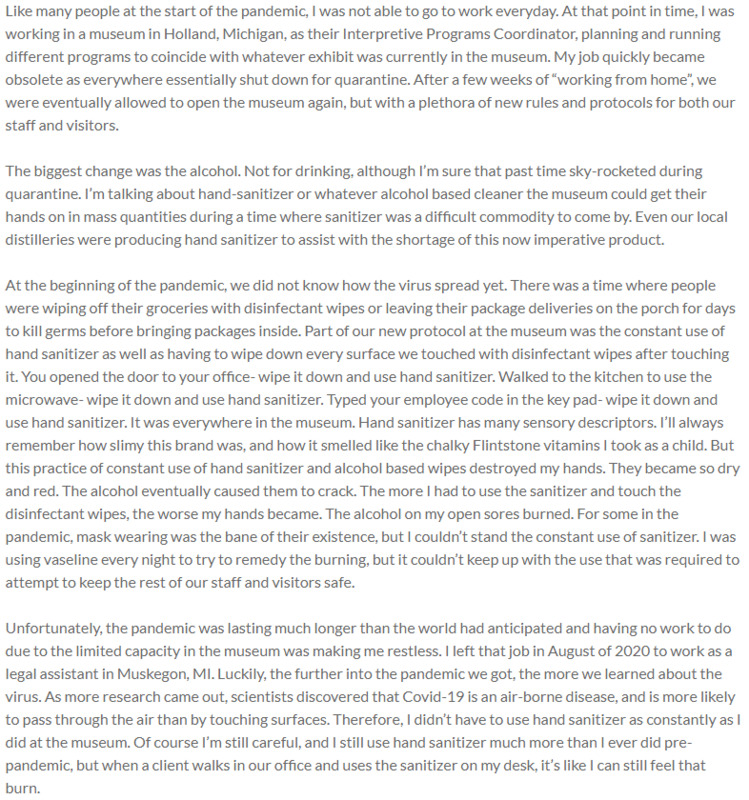Elemento
Feeling the Burn
Título (Dublin Core)
Feeling the Burn
Disclaimer (Dublin Core)
DISCLAIMER: This item may have been submitted in response to a school assignment prompt. See Linked Data.
Description (Dublin Core)
Like many people at the start of the pandemic, I was not able to go to work everyday. At that point in time, I was working in a museum in Holland, Michigan, as their Interpretive Programs Coordinator, planning and running different programs to coincide with whatever exhibit was currently in the museum. My job quickly became obsolete as everywhere essentially shut down for quarantine. After a few weeks of “working from home”, we were eventually allowed to open the museum again, but with a plethora of new rules and protocols for both our staff and visitors.
The biggest change was the alcohol. Not for drinking, although I’m sure that past time sky-rocketed during quarantine. I’m talking about hand-sanitizer or whatever alcohol based cleaner the museum could get their hands on in mass quantities during a time where sanitizer was a difficult commodity to come by. Even our local distilleries were producing hand sanitizer to assist with the shortage of this now imperative product.
At the beginning of the pandemic, we did not know how the virus spread yet. There was a time where people were wiping off their groceries with disinfectant wipes or leaving their package deliveries on the porch for days to kill germs before bringing packages inside. Part of our new protocol at the museum was the constant use of hand sanitizer as well as having to wipe down every surface we touched with disinfectant wipes after touching it. You opened the door to your office- wipe it down and use hand sanitizer. Walked to the kitchen to use the microwave- wipe it down and use hand sanitizer. Typed your employee code in the key pad- wipe it down and use hand sanitizer. It was everywhere in the museum. Hand sanitizer has many sensory descriptors. I’ll always remember how slimy this brand was, and how it smelled like the chalky Flintstone vitamins I took as a child. But this practice of constant use of hand sanitizer and alcohol based wipes destroyed my hands. They became so dry and red. The alcohol eventually caused them to crack. The more I had to use the sanitizer and touch the disinfectant wipes, the worse my hands became. The alcohol on my open sores burned. For some in the pandemic, mask wearing was the bane of their existence, but I couldn’t stand the constant use of sanitizer. I was using vaseline every night to try to remedy the burning, but it couldn’t keep up with the use that was required to attempt to keep the rest of our staff and visitors safe.
Unfortunately, the pandemic was lasting much longer than the world had anticipated and having no work to do due to the limited capacity in the museum was making me restless. I left that job in August of 2020 to work as a legal assistant in Muskegon, MI. Luckily, the further into the pandemic we got, the more we learned about the virus. As more research came out, scientists discovered that Covid-19 is an air-borne disease, and is more likely to pass through the air than by touching surfaces. Therefore, I didn’t have to use hand sanitizer as constantly as I did at the museum. Of course I’m still careful, and I still use hand sanitizer much more than I ever did pre-pandemic, but when a client walks in our office and uses the sanitizer on my desk, it’s like I can still feel that burn.
The biggest change was the alcohol. Not for drinking, although I’m sure that past time sky-rocketed during quarantine. I’m talking about hand-sanitizer or whatever alcohol based cleaner the museum could get their hands on in mass quantities during a time where sanitizer was a difficult commodity to come by. Even our local distilleries were producing hand sanitizer to assist with the shortage of this now imperative product.
At the beginning of the pandemic, we did not know how the virus spread yet. There was a time where people were wiping off their groceries with disinfectant wipes or leaving their package deliveries on the porch for days to kill germs before bringing packages inside. Part of our new protocol at the museum was the constant use of hand sanitizer as well as having to wipe down every surface we touched with disinfectant wipes after touching it. You opened the door to your office- wipe it down and use hand sanitizer. Walked to the kitchen to use the microwave- wipe it down and use hand sanitizer. Typed your employee code in the key pad- wipe it down and use hand sanitizer. It was everywhere in the museum. Hand sanitizer has many sensory descriptors. I’ll always remember how slimy this brand was, and how it smelled like the chalky Flintstone vitamins I took as a child. But this practice of constant use of hand sanitizer and alcohol based wipes destroyed my hands. They became so dry and red. The alcohol eventually caused them to crack. The more I had to use the sanitizer and touch the disinfectant wipes, the worse my hands became. The alcohol on my open sores burned. For some in the pandemic, mask wearing was the bane of their existence, but I couldn’t stand the constant use of sanitizer. I was using vaseline every night to try to remedy the burning, but it couldn’t keep up with the use that was required to attempt to keep the rest of our staff and visitors safe.
Unfortunately, the pandemic was lasting much longer than the world had anticipated and having no work to do due to the limited capacity in the museum was making me restless. I left that job in August of 2020 to work as a legal assistant in Muskegon, MI. Luckily, the further into the pandemic we got, the more we learned about the virus. As more research came out, scientists discovered that Covid-19 is an air-borne disease, and is more likely to pass through the air than by touching surfaces. Therefore, I didn’t have to use hand sanitizer as constantly as I did at the museum. Of course I’m still careful, and I still use hand sanitizer much more than I ever did pre-pandemic, but when a client walks in our office and uses the sanitizer on my desk, it’s like I can still feel that burn.
Date (Dublin Core)
June 2020
Creator (Dublin Core)
Avery Lowe
Contributor (Dublin Core)
Avery Lowe
Event Identifier (Dublin Core)
HST643
Partner (Dublin Core)
Arizona State University
Tipo (Dublin Core)
text story
Controlled Vocabulary (Dublin Core)
English
Health & Wellness
English
Public Space
English
Museums & Libraries
Curator's Tags (Omeka Classic)
Holland
Michigan
alcohol
sanitization
hand sanitizer
museum
sensory history
Contributor's Tags (a true folksonomy) (Friend of a Friend)
sensory history
museum
hand-sanitizer
alcohol
Holland
pain
Linked Data (Dublin Core)
Date Submitted (Dublin Core)
02/01/2022
Date Modified (Dublin Core)
03/15/2022
Colecciones
This item was submitted on February 1, 2022 by Avery Lowe using the form “Share Your Story” on the site “A Journal of the Plague Year”: https://covid-19archive.org/s/archive
Click here to view the collected data.

